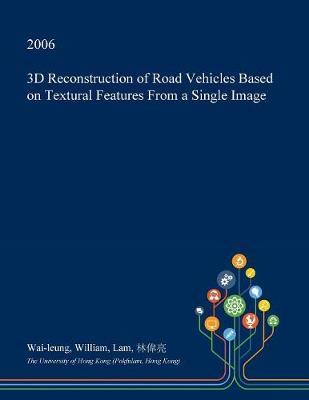Overview
This dissertation, 3D Reconstruction of Road Vehicles Based on Textural Features From a Single Image by Wai-leung, William, Lam, 林偉亮, was obtained from The University of Hong Kong (Pokfulam, Hong Kong) and is being sold pursuant to Creative Commons: Attribution 3.0 Hong Kong License. The content of this dissertation has not been altered in any way. We have altered the formatting in order to facilitate the ease of printing and reading of the dissertation. All rights not granted by the above license are retained by the author. Abstract: Abstract of thesis entitled 3D Reconstruction of Road Vehicles Based on Textural Features from a Single Image submitted by William Wai Leung LAM for the degree of Doctor of Philosophy at The University of Hong Kong in April 2006 In this thesis, a deformable model based vehicle shape reconstruction method for visual traffic surveillance is presented. The methodology is draws upon the philosophy of textural features, which enable shape reconstruction of moving vehicles from a single traffic image. The aim of this study is to develop a methodology to recover 3D vehicle profile through analyzing daytime traffic images where the surveillance camera has to be stationary while textural features of the vehicles and background are significantly different. Fundamentally, the methodology consists of three steps: vehicle segmentation, component identification and vehicle shape reconstruction. Each step has been investigated and novel algorithms have been developed for this research. Generally, the results of vehicle segmentation are strongly affected by two issues: moving cast shadows and reflective regions, both of which reduce accuracy and require post-processing to alleviate the degradation. We therefore propose an efficient and highly accurate texture-based method for extracting the boundary of vehicles from a stationary background that is free from the effect of moving cast shadows and reflective regions. The segmentation method utilizes the differences in textural property between the vehicle-cast shadow, the road and the vehicle itself, rather than just their intensity differences. By further combining the luminance and chrominance properties, a number of foreground vehicle masks are constructed through a series of morphological operations. The proposed method was tested on genuine traffic image sequences and achieved an average error rate of 3.44% over 50 tested vehicle images. In the proposed component identification method, vehicles are first divided into multi-scale regions based on the center of gravity of the vehicle mask and calibrated camera parameters. With these multi-scale regions, textural couriers are generated based on the localized variances of the vehicle image. A new scale space model is subsequently created based on the textural couriers to provide a topological structure of the vehicle. In this model, key feature points of the vehicle are extracted, which enables further segmentation of component regions. This method was evaluated and tested on 200 different vehicle samples captured in routine outdoor traffic images and achieved average accuracy rates of 100% for component identification and 96.6% for component classification with a variety of vehicles and traffic scenes. Finally, a deformable model based vehicle shape reconstruction method has been developed to recover 3D vehicle shapes from a traffic image by exploiting the rigidity of vehicles. A component identification method has been employed to describe the vehicle features. Based on the camera calibration method, the 3D coordinates of those components can be recovered for constructing vehicle profiles. The 3D vehicle shape provides important information that allows the traffic scene to be understood and analyzed. All vehicle components achieved from component identification method have been successfully recovered to deformable 3D vehicle model. Sin
Full Product Details
Author: Wai-Leung William Lam ,
林偉亮
Publisher: Open Dissertation Press
Imprint: Open Dissertation Press
Dimensions:
Width: 21.60cm
, Height: 0.80cm
, Length: 27.90cm
Weight: 0.336kg
ISBN: 9781361470190
ISBN 10: 1361470194
Publication Date: 27 January 2017
Audience:
General/trade
,
General
Format: Paperback
Publisher's Status: Active
Availability: Temporarily unavailable

The supplier advises that this item is temporarily unavailable. It will be ordered for you and placed on backorder. Once it does come back in stock, we will ship it out to you.



